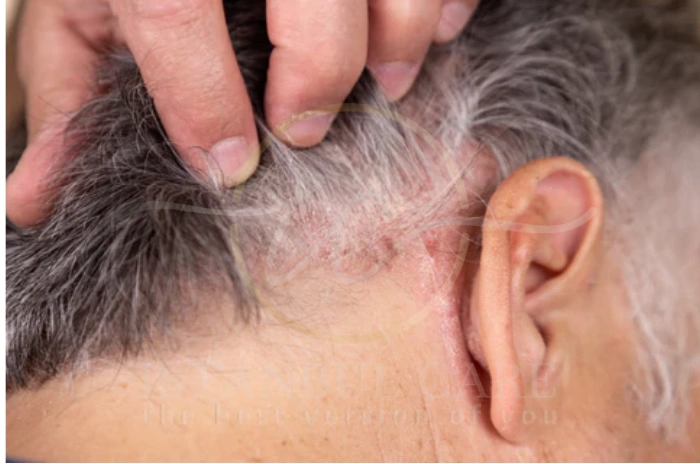Aching Scalp and Common Symptoms You May Notice
Scalp pain manifests in various ways, and recognizing these symptoms early can help prevent further complications. The most common signs include a persistent aching sensation, especially when touching or brushing your hair. Many people describe this feeling as similar to having worn a tight ponytail for too long. Tender scalp areas often feel sensitive to light touch or pressure. You might notice discomfort when lying on a pillow, wearing hats, or even during gentle hair washing. This tenderness can vary from mild sensitivity to sharp, shooting pains that make normal activities uncomfortable. Burning or tingling sensations frequently accompany scalp tenderness. These feelings may come and go throughout the day or remain constant. Some individuals report a crawling sensation on their scalp, as if insects are moving across the skin surface. Scalp hurts to touch is another common complaint that often indicates inflammation or nerve sensitivity. This symptom typically worsens with direct contact and may be accompanied by visible redness or swelling in affected areas.Understanding the Causes of an Aching Scalp and Hair Loss
| Condition | Primary Symptoms | Hair Loss Pattern | Treatment Approach |
|---|---|---|---|
| Seborrheic dermatitis | Red, scaly patches, itching | Diffuse thinning | Medicated shampoos, antifungals |
| Scalp psoriasis | Thick silver scales, bleeding | Patchy hair loss | Topical steroids, biologics |
| Infected hair follicle | Painful bumps, pus | Localized loss | Antibiotics, drainage |
| Tension headache scalp | Tight band sensation | Minimal direct loss | Stress management, massage |
| Traction alopecia tight hairstyles | Crown/temple pain | Hairline recession | Style changes, gentle care |
| Sunburn scalp | Burning, peeling | Temporary shedding | Sun protection, moisturizing |
How Scalp Tension Can Lead to Discomfort
Physical tension in the scalp muscles contributes significantly to scalp pain and can indirectly affect hair health. Chronic muscle tension restricts blood flow to hair follicles, potentially impacting their ability to receive essential nutrients. This reduced circulation can weaken hair and contribute to gradual thinning. Tension headache scalp pain often radiates from neck and shoulder muscles that connect to scalp tissues. When these muscles remain contracted for extended periods, they can create a tight, aching sensation across the entire scalp. This tension can make the scalp feel sore and sensitive to touch. Stress-related muscle tension frequently affects the scalp area, particularly around the temples and crown. Chronic stress increases cortisol levels, which can disrupt normal hair growth cycles while simultaneously increasing muscle tension. This creates a dual impact on both scalp comfort and hair health. Traction alopecia tight hairstyles can create constant pulling pressure on hair follicles, leading to both scalp tenderness and progressive hair loss. Tight braids, ponytails, or hair extensions create mechanical stress that inflames follicles and can cause permanent damage over time.How Scalp Pain Is Connected to Hair Loss
The connection between scalp pain and hair loss involves complex inflammatory processes that affect follicle health. When scalp tissues become inflamed, they release chemicals that can damage or weaken hair follicles. This inflammatory response often precedes noticeable hair loss by weeks or months. Trichodynia, or scalp dysesthesia, describes the painful scalp sensations that often accompany hair loss conditions. This neurological symptom can occur without visible scalp changes but frequently indicates underlying follicle inflammation. Many people with androgenetic alopecia report trichodynia in areas where hair loss eventually becomes apparent. Chronic inflammation disrupts the normal hair growth cycle by shortening the anagen (growth) phase and extending the telogen (resting) phase. This disruption leads to progressively shorter, thinner hair strands that eventually stop growing altogether. The inflammatory process can make the scalp feel sore and tender throughout this progression. Hair extensions hair loss commonly occurs when synthetic or heavy extensions create constant tension on natural hair follicles. The pulling force can cause immediate scalp pain and lead to permanent follicle damage if the extensions remain in place for extended periods.Effective Treatments for Scalp Pain and Discomfort
Anti-inflammatory treatments form the foundation of managing aching scalp and related hair loss. Topical corticosteroids can reduce inflammation and provide pain relief, though they should be used under medical supervision. Over-the-counter anti-inflammatory medications may also help manage both pain and underlying inflammation. Fragrance free shampoo products can significantly reduce scalp irritation for people with sensitive skin. Many commercial shampoos contain harsh chemicals and fragrances that can worsen scalp conditions. Switching to gentle, hypoallergenic products often provides immediate relief from burning and tingling sensations. Medicated shampoos containing ingredients like ketoconazole, selenium sulfide, or zinc pyrithione can address underlying fungal or bacterial issues contributing to scalp pain. These treatments work best when used consistently and as directed by healthcare providers. Scalp massage techniques can improve circulation and reduce tension-related scalp tenderness. Gentle circular motions with fingertips can promote blood flow and provide immediate pain relief. Regular massage may also stimulate hair follicles and support healthier hair growth.What to Expect During a Scalp Diagnosis
A comprehensive scalp examination begins with a detailed medical history focusing on pain patterns, hair loss progression, and potential triggers. Your healthcare provider will ask about recent illnesses, medications, stress levels, and family history of hair loss or scalp conditions. Physical examination of the scalp involves careful inspection of hair density, scalp skin condition, and areas of tenderness. Your doctor may use magnification tools to examine individual hair follicles and assess inflammation levels. Gentle palpation helps identify areas of scalp tenderness and potential trigger points. Blood tests may be ordered to check for underlying conditions contributing to scalp pain and hair loss. Hormone levels, vitamin deficiencies, and inflammatory markers can provide valuable insights into potential treatment approaches. Thyroid function tests are particularly important for identifying metabolic causes.The Connection Between Headaches and Scalp Sensitivity
Tension headache scalp pain often overlaps with chronic scalp sensitivity, creating a cycle of discomfort that can worsen both conditions. The muscles and nerves that cause tension headaches extend into scalp tissues, making it difficult to distinguish between headache and scalp-specific pain.
Migraine headaches frequently involve scalp sensitivity that can persist between episodes. Many migraine sufferers report scalp hurts to touch sensations during and after headache attacks. This sensitivity can make normal hair care activities painful and may contribute to hair damage through avoidance of proper grooming.
Chronic daily headaches can create persistent scalp tenderness that interferes with sleep, work, and daily activities. The constant muscle tension associated with these headaches can restrict blood flow to hair follicles and contribute to gradual hair thinning over time.
We’re ready to answer your questions
Scalp pain can result from inflammation, tension, infections, autoimmune conditions, or nerve sensitivity, often requiring medical evaluation to determine the specific cause.
Yes, chronic scalp tenderness often indicates underlying inflammation or follicle damage that can disrupt normal hair growth cycles and lead to progressive hair loss.
Trichodynia refers to painful scalp sensations without visible skin changes, commonly occurring in areas where hair loss may eventually develop, particularly in androgenetic alopecia.
Seek medical attention if aching scalp persists for more than two weeks, worsens despite treatment, or occurs with significant hair loss, fever, or spreading symptoms.
Follow us on social media for updates, tips, and patient success stories:

